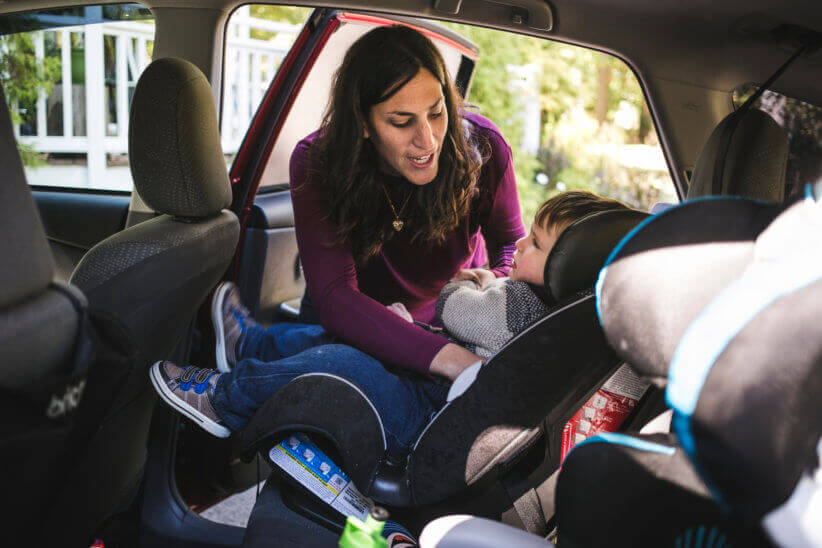For many years, the American Academy of Pediatrics had strict rules about screen time — no exposure for kids under 2 and no more than two hours a day for preschoolers. Last December, the Academy abandoned those guidelines, acknowledging what parents already knew: screens are everywhere.
One recent study, published in the Academy’s journal Pediatrics, found “nearly universal exposure” for children under 2. Even under age 1, half of all babies interacted with a mobile device every single day, playing simple games, watching videos, and fooling with apps. Academy policy makers concluded, “In a world in which ‘screen time’ is becoming simply ‘time’ our policies must evolve or become obsolete.”
The revised guidelines from the Academy don’t offer specific rules, perhaps because there isn’t clear-cut research showing that certain uses of mobile devices help or harm very young children. Instead, they provide general advice, intended to guide parents as they make decisions about when to hand over a tablet or a cellphone to a baby or a toddler. Here are the guidelines:
Media is just another environment. Child development hasn’t changed. The Academy points out that kids do what they have always done, but now they do much of it virtually. The most rapid period of brain development takes place before age 3, so infants and toddlers need a wide range of experiences, with and without technology, under the supervision of loving adults.
Parenting has not changed. Parents still have to make decisions about what’s good for a particular child in a particular situation. The video that makes one child giggle may be overstimulating to another child or the same child at a different time of day. Good parents respond flexibly to new situations and, most importantly, to each child.
Role-modeling is critical. Little kids imitate adults. Parents who want kids to have healthy relationship with screens will have to model self-control by setting limits for themselves.
We learn from each other. Young children learn most easily when they are interacting with people. Language, in particular, develops most readily during natural back-and-forth exchanges between babies and adults. According to some studies, lengthy passive exposure to media such as videos may actually inhibit language acquisition. On the other hand, technology that promotes interaction — video chatting with a family member, for example — may stimulate language and other kinds of learning.
Content matters. Rather than setting arbitrary limits on time spent with screens, the Academy recommends that parents think about everything a child does during the day. Is there plenty of time for being outdoors, moving around, reading books, singing songs, snuggling, being silly? Time with technology becomes a problem when it edges out other activities.
Curation helps. Any app can claim that it’s educational. Very few have research to back up that claim. Little children, in particular, deserve the highest-quality products parents can find. Before downloading an app or firing up a video, check reviews from organizations like Parents’ Choice (parents-choice.org), Children’s Technology Review (childrenstech.com) or Common Sense Media (commonsensemedia.org).
Co-engagement counts. The Academy points out that kids are more likely to benefit from screen time if adults are involved. Just talking about what a child is seeing or doing on a screen provides context and gives a small child a sense of connection.
Playtime is important. Unstructured playtime stimulates creativity and independence. Unplugged play is especially important for very young children, because they learn from touching and manipulating objects in the three-dimensional world.
Set limits. As many adults know, technology can have a mesmerizing effect. Games, in particular, are often designed to encourage mindless swiping, and little kids — like everyone else — may find it difficult to disengage. Setting limits requires the same gentle but firm techniques parents use in other settings. When children want cookies for lunch — or unlimited time on the iPad — it’s up to parents to steer them in a different direction.
Create tech-free zones. In particular, the Academy recommends that parents teach kids to power-down during meals and at bedtime. Little children are more likely to adopt healthy eating habits if meals are a happy, social time with lots of playful interaction. At bedtime, research shows that light from screens can interfere with sleep cycles, so the Academy recommends devices be kept out of bedrooms.
Carolyn Jabs raised three computer-savvy kids including one with special needs. She has been writing Growing Up Online for 10 years and is about to publish a book called “Cooperative Wisdom: Bringing People Together When Things Fall Apart.” Visit www.growi
Copyright, 2016, Carolyn Jabs. All rights reserved.





















